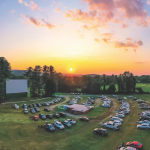Each of these vignettes about the Nashville touring industry that we've been doing this summer, starting with the May issue of FOH, offers an opportunity to look at another aspect of what is the most highly developed touring sound, lighting/video and staging infrastructure in the world.
More tours launch out of Nashville every spring than any other location, and not just country music artists but rock, pop, R&B and Christian, as we've seen in the last two months here in the pages of FOH and PLSN.
No one understands how geography is destiny better than the music industry's road warriors, and mixers will tell you that Nashville's central location, within a day's drive of most U.S. population centers and astride three Interstate highways, is why they're there. "It's so easy to tour out of Nashville, it's the perfect location for everyone to meet up," says Brett "Scoop" Blanden, currently working FOH for CMA, ACM and Grammy winners Lady Antebellum, who also notes the plethora of rental, supply and logistics providers the city has.
That does give those already within the city's live sound and touring community an inside track on working there. "It simply wouldn't be cost effective to, for instance, hire a system tech from out of town when you have access to so much talent right here," says Blanden.
Nashville's music industry in general is notoriously clique-y; the major record labels have always maintained local control over their rosters and have fiercely resisted interference from New York and L.A. over the decades. That's reinforced a fairly impervious industry hierarchy in that time – in an industry where executive tenure is often measured in months, Joe Galante just stepped down as chairman of RCA Nashville after 28 years. However, while Nashville's surfeit of touring work draws plenty of aspiring live sound mixers to town, the touring client pyramid also has a pretty wide base, with dozens of first-album artists ready to hit the road, but with very tight budgets.
Despite the fact that he spent his first five or so years in Nashville working as a studio engineer and manager, Blanden says, "it was a lot easier for me to get my foot in the door here [as an FOH mixer] because those kinds of artists didn't have to pay me a lot of money."
That kind of entryway to the touring business is critical, given that the loyalty between artists, musicians and technicians in the country music business means some FOH and monitor mixers can come close to qualifying for gold watches. John Ward, for instance, has mixed FOH for Tim McGraw for 16 years. While Nashville exerts plenty of "natural attrition" on the touring pool of systems talent, once you begin to build solid relationships, he says Nashville can have an edge over other touring centers. "There's more doors to knock on," says Ward, ranging from artist management companies to SR providers, whose shops many mixers have been known to take temporary work at during off months in order to stay available to their artist-clients when touring season starts again.
The Good, the Not-So-Good
Perhaps the biggest career advantage that Nashville offers mixers is the fact that country music artists tour relentlessly, taking just months instead of years off from the road to make records, unlike their rock ‘n' roll counterparts. Furthermore, the country music audience is far kinder to its classic artists than any other mainstream genre, with artists able to tour profitably for years and even decades after their last #1 record.
However, that has to be countered against a two-year-long recession and a decade-long slide in music industry revenues, both of which have significantly cut into touring budgets. Mixers have felt the effect.
"New artists today can easily find guys who will go out as tour manager, production manager and mix front of house, for $250 to $400 a day," says Kenny "KT" Thurman, who spent the last five years covering all those bases for Mark Chesnutt. "The days of going out for $750 a day are few and far between today."
Nashville is also a destination for a growing number of graduates from media arts academies, like Full Sail University, SAE and others, which have added extensive live sound components to their curricula. As good as country music's large base of new and classic artists is at absorbing growing numbers of aspiring mixers entering the market, supply will outpace even that demand at some point, further driving down wage leverage.
Economic volatility is ubiquitous now, and more so in the music industry than even the larger economy, which is beginning to show some signs of stabilization, something that CD and ticket sales would love to experience. But natural disasters notwithstanding, Nashville has implemented by serendipity the strategy that vast numbers of businesses pursued desperately during the downturn: Nashville is a textbook case in consolidation – everything you need to make music and put it on the road is within hailing distance.
In an era in which digital technology has decentralized the way music is made and distributed, Nashville actually strengthened and expanded its core capabilities, thus generating even greater gravity to continue to pull new talent and services in. In terms of what it takes to put a tour out on the road, Nashville is literally, and will be for the foreseeable future, the first stop anyone needs.
After the Flood: A Postscript
We should also take this opportunity to provide updates on the aftermath of the flooding that followed record rainfalls on the first weekend in May, which saw over 13 inches descend on Music City in less than 48 hours, creating a kind of inland Katrina. At this writing, the overall toll of the flood stands at $1.4 billion. Nashville's touring business is still picking its way out of the mud, most notably at Soundcheck, the world's largest rehearsal facility and the staging and storage site for an estimated 70 percent of what country music puts out on the road every year, which sustained significant damage from the flood. The Grand Ole Opry's shows continued to take place at alternate venues as the Opry House on the Gaylord Hotel campus underwent repairs after the Opry stage was flooded, ruining instruments, costumes and equipment. Similarly, the Nashville Symphony was also performing in other venues in the wake of flooding at the Schermerhorn Center, which destroyed instruments and seating. On the positive side, the CMA Music Fest went on as planned June 10-13 at downtown's Riverfront Park and LP Field, both of which sustained flooding but were quickly brought back on line.



